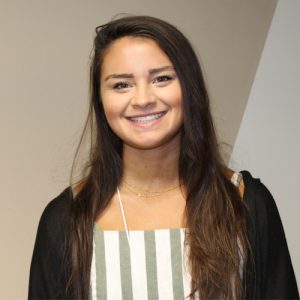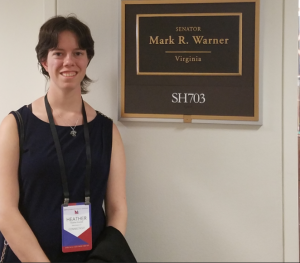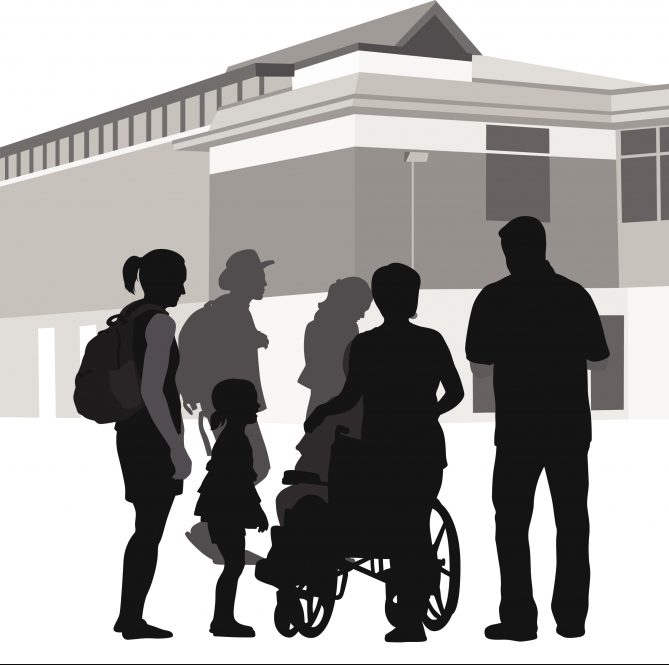Imagine how a child who uses a wheelchair feels during school recess when no one plays with them or when they’re left behind during a fire drill.
Imagine how parents feel when their child with autism spectrum disorder (ASD) is repeatedly excluded from social gatherings because of challenging behaviors.
Imagine how scared parents and their child feel when they graduate from high school and have no job, options for post-secondary education, or living options.
And when’s the last time you socially interacted with a person with a disability in your community, or even saw a person with a disability included in community activities you take for granted?
Since the late 1980s UConn has been hard at work to change these everyday realities experienced by persons with disabilities and their families. The cross-campus Center of Excellence in Developmental Disabilities Education, Research and Service (UCEDD), based at UConn School of Medicine, achieves this through multidisciplinary scientific research, evidence-based intervention practices, community-based service delivery and ongoing policy reform. Funded by the Federal Developmental Disabilities Act, the goal of UConn and all 67 UCEDDs nationwide is to help persons with disabilities achieve outcomes that result in being able to live as independently as possible, be productive members of society, work in paying jobs, and have the greatest quality of life possible.
“Our number-one goal is to enhance the quality of life of those with developmental disabilities and that of their families,” says early childhood intervention expert Dr. Mary Beth Bruder, the UCEDD’s director and professor of public health sciences and pediatrics at the UConn School of Medicine and Neag School of Education. “A qualified workforce to help accomplish this goal is critical for all of society.”
What it Means to LEND a Hand
To build a more qualified workforce, the UCEDD currently funds the graduate training of 30 students from different professional disciplines at UConn, all funded by federal grants. Thirteen of these students are participating in a one-year fellowship through the Connecticut Leadership Education in Neurodevelopmental and Related Disabilities (LEND) program, also directed by Bruder. In addition, the UConn UCEDD is funding 13 doctoral students in early childhood and disability studies at 10 research universities across the country.
UConn’s LEND, federally-funded along with generous in-kind donations from UConn, its School of Medicine and faculty, each year provides more than a dozen scholars the opportunity to receive graduate assistantships for one year to focus on specialty training in developmental disabilities within their own discipline. The scholars focus on team-based learning across disciplines with other students and conduct research to advance early diagnosis and intervention, school-based education, and post-secondary school options to enhance the quality of lives of those with developmental disabilities and their families.
Our number-one goal is to enhance the quality of life of those with developmental disabilities and that of their families. — Dr. Mary Beth Bruder
Each LEND trainee receives 600 hours of interdisciplinary leadership training, which includes participating in a 30-week course and practica in the field; demonstrating competence in core leadership areas; completing field assignments; and designing and implementing interdisciplinary advocacy and research projects to demonstrate leadership in the field of developmental disabilities. Along with graduate students, community-based professionals, family members and persons with disabilities participate in the trainings.
“The LEND training program has been building the pipeline of our future leaders and workforce for those with developmental disabilities, including those with autism, and finding new ways to improve the services and outcomes for this population,” says Bruder.
She says there is indeed a science about how to provide services to those with disabilities beginning at birth, and this science is sometimes lacking because of an undertrained workforce.
“LEND is teaching our future leaders in disability research, education and service how to change this so that families and their children will benefit from the best science has to offer,” says Bruder. “While their child may not be on the exact timetable as another child, children and adults with developmental disabilities can learn, be in schools and communities, can have friends, and be happy!”
Bruder adds: “UConn’s LEND program and our trainees are creating opportunities for families to visualize a positive future for their child, from early childhood through adulthood.”
A Passion for Public Health – and Research

One LEND scholar making a difference is Holly LaBrecque ’19 (CLAS) ’20 MPH. The Orono, Maine native earned her bachelor’s degree in psychology and her master’s in public health, with a research concentration and minor in neuroscience.
“I love UConn!” says LaBrecque, a 2019-2020 LEND scholar who serves as a LEND teaching assistant while pursuing her PhD in public health. “I wanted to go into research, and UConn gave me that opportunity from the start. I found out about the LEND program through my advisor, who was also the principal investigator of my autism lab at UConn. I asked if she knew of any opportunities to combine my passions in public health and neurodevelopmental disability research. She had the perfect suggestion.”
Labrecque conducted research in UConn’s Connecticut Autism and Language Lab, investigating the long-term outcomes of individuals with autism and also the impact of autism spectrum disorder on language processing.
“We know children with autism who receive early detection and intervention have better social and cognitive outcomes. Also, supporting the entire family is so important,” says Labrecque, whose career goal is to enter academic medicine and research to advance early screening measures for detecting autism and other neurodevelopmental disabilities.
In addition, she plans to focus on improving access to early intervention and inclusion for young children with disabilities.
“When it comes to any child, inclusion is so important. I hope to help dissolve any current disparities in delivery of educational assistance and services across ethnic or socio-economic groups for those children who may be less likely to get timely interventions they need or not granted access to be in the same classroom as children without disabilities,” says LaBrecque.
According to LaBrecque, the common early signs of autism spectrum disorders include a child not making eye contact, or not being interested in social play or interaction. An ASD diagnosis can be made as early as 18 months of age with early diagnosis and intervention being critical during the first few years of brain development.
LaBrecque says her most valuable LEND experience was the opportunity to be matched with families who have children with disabilities. “Having the privilege to get to know these families through school meetings, doctor visits, and other community activities has given me insight on how to advocate with and improve services for these families.”
The Value of Being an Advocate

Heather Kwolek, 26, of Virginia, is a 2018-2019 LEND trainee and serves as a LEND teaching assistant as she pursues her PhD in school psychology at the Neag School of Education. She graduated from Indiana University of Pennsylvania with a degree in psychology.
With the knowledge Kwolek has gained through LEND, she’s on a mission to make a difference in the lives of those with disabilities and their families by ensuring each individual is able to fully participate in all educational settings, and that appropriate educational modifications and interventions are provided as necessary.
“I find the LEND program incredibly valuable and I love how each trainee is matched with a family with a child with disabilities each semester to learn from them,” says Kwolek. “There is so much going on in each family’s life when they have a child with a disability, and learning about their daily lives helps us work across multidisciplinary teams to get them the support and services they need.”
Kwolek credits LEND for its strong advocacy training, which brought her and other students last year to Washington, D.C., to meet with legislators to fight for the state’s population of children and adults with disabilities.
“Children and their families are at the center of everything LEND trainees learn and do,” she says.
Interestingly, Kwolek came to UConn thinking she wanted to be a school psychologist working with gifted children. But LEND gave her the eye-opening opportunity to gain new insight and interest in school emergency response planning for students with disabilities after a chance encounter with a student who used a wheelchair.
“A person who used a wheelchair shared how during a school fire drill, which he thought was a real fire, nobody came to help him navigate down the stairs and out of the building,” says Kwolek.
After hearing this heartbreaking story, Kwolek is now determined to enter a career field to perform research to add to the science to help improve the lives and safety of children with disabilities in school emergencies across the country.
“LEND is helping me carve my own path and improve the lives of children with disabilities in the process,” says Kwolek.
Bruder couldn’t agree more and knows these LEND trainees will make a difference for those with disabilities in each of their own disciplines, as well as in interdisciplinary activities, which is another focus of LEND.
“By training these talented graduate school students, LEND brings the latest research to practice,” says Bruder. “There is a huge gap in what we know and what is happening in communities and schools. LEND is working hard to improve the quality of life of children, youth, and adults with developmental disabilities through the translation and application of research knowledge to transform practice and policy.”
Training Future Leaders in the Field
LEND, officially established in 2009 at UConn with its first three-year grant funding and subsequent renewals, has trained more than 100 graduate trainees and 150 community professionals, family members, and persons with disabilities. An interdisciplinary faculty also participates from the UConn Graduate School’s programs, along with family faculty.
The incoming class of 2020-21 has 15 student scholars from across disciplines of special education, nursing, public health, school psychology, audiology, speech and language, pediatrics, and public health, along with interdisciplinary faculty coordinators. They are all focused together on enhancing the lives of people with disabilities.
Bruder credits the School of Medicine’s dean, Dr. Bruce T. Liang, the Office of the Provost, and the Graduate School for their ongoing commitment and support to LEND program trainees.
“Scholarships are huge to attract the best and brightest to train for a year at UConn to improve the lives of children with disabilities here in Connecticut and across the country,” says Bruder. “UConn allows us to rigorously train the next generation of professionals who can deliver services to the community, and ensure the field is more scientific-based and the latest findings are translated into daily practice and policy. We really are trying to create a stronger national workforce that applies the best evidence-based practice for children with disabilities to improve their quality of life through adulthood.”
Bruder adds: “The pandemic has put the magnifier on the fact that our workforce not only has shortages, but shortages of qualified and well-trained professionals. Thankfully UConn is known to have rigorous training programs for this population.”
There are 52 LENDs in the U.S. along with 67 UCEDDs. With more than $1.2 million in federal funding each year for these grants, Connecticut’s UCEDD and LEND programs are committed to enhancing the quality of life for people with developmental disabilities from birth to adulthood, with a major focus on the early years of birth to 5.
“There’s a lot more work to do for those with developmental disabilities,” says Bruder. “And UConn is on the front lines.”



